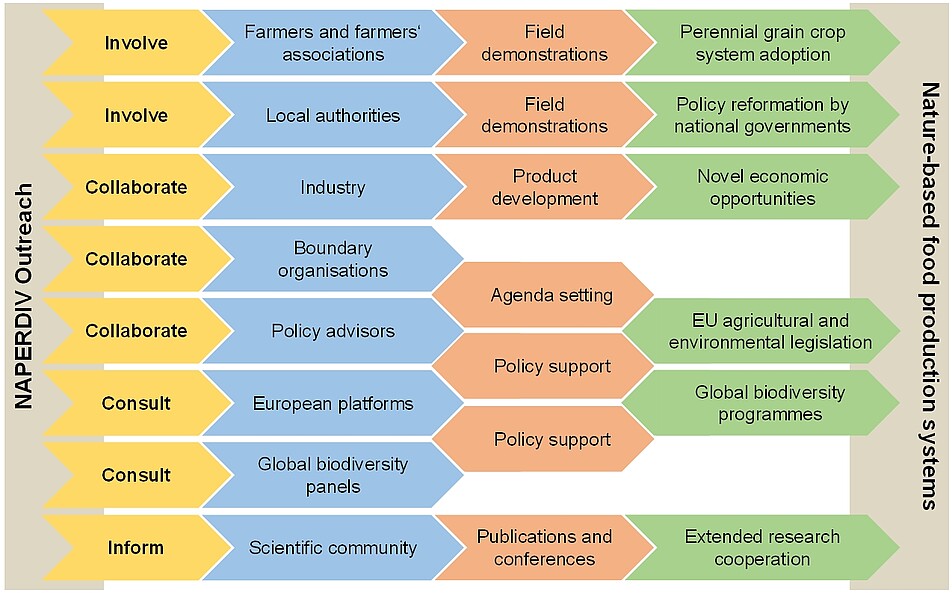The promotion of our “perennial grain vision” at the EU and global level requires a step-wise approach, considering adjusted identification, engagement, and sensitisation of stakeholders. NAPERDIV will follow a hierarchical dissemination strategy to reach end-users with different interests and political influence. Our initial stakeholder analysis identified several stakeholder groups at national (e.g. farmers, farmer associations, industry) and international (e.g. EU) level. Since perennial grain crops represent a novel agricultural feature, we will involve these stakeholders in a co-creation process in NAPERDIV to boost the ecological and economic attention of this concept. We expect that this strategy will consecutively pique the interest of policy makers at higher level, including specifically EU legislation, that will be reached by adjusted multiplication channels. A direct contact to EU legislative bodies is not planned during NAPERDIV. This is justified, because perennial grain crops at European level are currently used mainly for small-scale research purpose and, hence, respective sensitisation of politicians at EU level needs first to be initialised. This will then lead to an attitudinal change and debate.
The evidence-based approach of NAPERDIV has multiple impacts:
(1) Economy: NAPERDIV generates novel bio-economic opportunities to satisfy the increasing demand for grains of nutritious value, biomass for feed and energy as well as generation of bio-based products; To recognize the growing interest and awareness of the business community regarding the value of managing and harnessing biodiversity and ecosystem services, NAPERDIV will pursue an integrated basic (metabolomics) and bio-economic (bioprospecting) research approach to explore functional traits of biotic system components of potential investment value, a central task of research and development activities of industry partners, which will be identified during NAPERDIV.
(2) Environment: NAPERDIV paves the way for sustainable agricultural options with limited use of agro-chemicals to conserve soil health and biodiversity;
(3) Society: NAPERDIV will contribute to food and nutrition security with reduced environmental impacts, also satisfying the increasing consciousness and demand for sustainable healthy food products among European consumers. PERGRAIN contributes to the secure access to safe and nutritious food for a healthy life;
(4) Policy: NAPERDIV will deliver a scientific baseline for present and prospective EU legislative frameworks to halt biodiversity loss and overall ecosystem degradation in the context of climate change. NAPERDIV will recognise a Pan-European context to develop and scale up future-proof nature-based solutions applicable in contrasting agro-ecologies that meet – in a multiple way – consumer and environment protection requirements including, but not limited to, restoration of degraded ecosystems, development of climate change adaptation and mitigation, as well as improvement of risk management and resilience.
(4) Transnational added value: NAPERDIV acts and networks at a Pan-European scale securing in the long-run the development of the industrial sector as well as maintenance of cooperative and multi-disciplinary research across European borders;
(5) Knowledge generation: NAPERDIV pursues a basic and bio-economic (‘bioprospecting’) research approach to explore relevant functional traits of biotic system components, a central task of research and development activities of involved industry partners.

